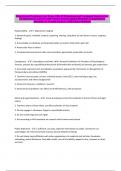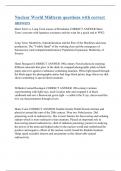Pennsylvania Psychology Law Exam -Title 49 Professional and Vocational Standards/Act
52 | Questions & Answers (100 %Score) Latest Updated 2024/2025 Comprehensive
Questions A+ Graded Answers | With Expert Solutions
Responsibility - ✔✔1. Objectivity, Integrity
2. Research topics, methods, analysis, reporting, sharing, using data, do not distort, misuse, suppress
findings
3. Accountable as individual, professionally liable, as teacher help others gain skill
4. Aware alter lives of others
5. Computerized assessments-data, tests provided, appropriate preparation of results
Competency - ✔✔1. Boundaries and limits, APA's General Guidelines for Providers of Psychological
Services, practice by unqualified professionals (informally then to Board), be licensed, gain supervision
2. Accurately represent self, accreditation association approved by Commission on Recognition of
Postsecondary Accredition (CORPA)
3. Teachers have accurate, current, scholarly lessons, have CEU's, have training to age, sex,
socioeconomic and ethnic backgrounds
4. Know test measures, validation, research
5. Know personal problems can affect work effectiveness, seek assistance
Moral and Legal Standards - ✔✔1. Know prevailing community standards of moral, ethical, and legal
nature
2. Teachers aware of how values can affect selection of class material
3. Do not engage in inhumane, illegal or unjustifiable actions
4. Do not violate legal and civil rights
5. Act according to APA standards on research with humans and animals
Public Statement - ✔✔1. Sufficient, accurate, objective information to public, licensed to use
psychologist, all must be licensed in group, factual telephone listings
2. Do not falsely imply affiliation with other organizations (in media do not be false, fraudulent,
misleading, partial disclosure, favorable results, one of kind ability, appeal to fear, compare to other
services)
, 3. No compensate for publicity, identify paid advertisement
4. Teachers accurate information
5. Do not engage in face to face solicitation of clients, avoid personal gain, correct others who
misrepresent, personal advice based on data
Confidentiality - ✔✔1. Must have written consent to share information through teaching, practice,
investigation (or from legal representation or guardian)
2. May reveal clear and imminent dangers to others (to professional workers or public authorities,
prevent harm to identified party), seek consultation
3. Avoid undue invasion of privacy, disguise teaching information, inform clients on limits of
confidentiality, need permission to reveal research subjects
4. Have plan for preserving and disposing of records
5. Protect interest of minors who cannot give informed consent
Welfare of Consumer - ✔✔1. Acknowledge conflict of interests, fully inform consumers, freedom of
choice in research participation
2. Recognize power in relationships, avoid dual relationships, keep all parties informed
3. Take action if demands of organization beyond reasonable conditions, in leadership role utilize
informed choice, confidentiality, due process, protection from harm
4. Clear financial arrangements, no reward for referrals
5. Terminate relationship if no benefit
Professional Relationships - ✔✔1. Act with due regard, benefit of related professions
2. Do not duplicate services, provide suitable work conditions, consultations, evaluations
3. Do not exploit relationships, do not engage in sexual harassment
4. Effect change in host organizations, respect sponsoring agencies, principal contributor first on
publications, compiler is chairperson or editor
5. Violations address informally but if threatens welfare of client take to the board
Utilization of Assessment - ✔✔1. Examined has rights to receive purpose, results, interpretations in
understandable language, do not impart unnecessary information, if test sponsored same rights (unless
written agreement with all parties)





